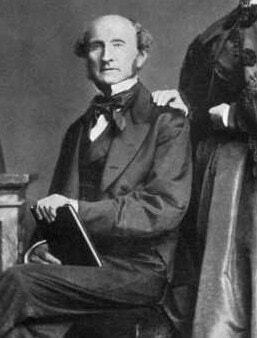John stuart mill, he was a London-born economist, philosopher and politician who championed utilitarianism that focused on the freedom, quality and gender equality, that he dedicated himself to finding a way to make women happy people.
When he turned 14 years old, he went to study economics, philosophy and law in France, it is there when he begins to create his own works. Then at age 20, he falls into a strong depressive picture as a result of the excessive demands of his father for the advancement of his studies, managing to recover after several years.
Advertisements
By overcoming the crisis, there is an opportunity to pursue other intellectual sources outside the ideals that his father had taught her, taking an interest in the positive ideas of socialism and romanticism. During this time he met the feminist and philosopher Herriet Taylor, who was his source of inspiration for these ideals and made her his wife after 21 years of knowing her.
Stuart worked in the East India inspection office until this company was dissolved in 1858. After he was a member of the Liberal Party in the British Parliament for 3 years, in that place he had the opportunity to defend with strength and determination, various measures in favor of the different social classes that were totally below being privileged, for the right of equality of women and made proposals to reform the system electoral.
Advertisements

In this article you will find:
Thought and Theory of John Stuart Mill
Among the main aspects of this philosopher's thought and theory are:
Advertisements
The greatest good for the greatest number of individuals
Stuart was heavily influenced by his good friend Jeremy Bentham. If Plato was convinced that the good was the truth, Bentham was a radical thinker who believed that the good corresponded to the useful.
However, he did not go to those extremes, but he thought that the useful had great relevance in the philosophical system at the time of correctly increase morality, therefore he established that the greatest good must be followed for the greatest amount of individuals.
Advertisements
The idea of freedom
For him, all people had to achieve the freedom to achieve everything that would make them happy and allow them to live properly. It is the only way to form a moral system without impositions.
The limits of freedom
For personal projects to guarantee full happiness, harm to others must be avoided.
Advertisements
Fixism
It is the idea that people are isolated from the context. This is a term used in psychology and philosophy of mind, a concept that Stuart defended despite not using it in his words.
By considering that each human being is sovereign over his body and mind, a conceptual framework can be established as a starting point for each individual to relate and take ownership of his properties, negotiating them without change.
Main Ideals of John Stuart Mill
His contribution came to cover different areas of philosophy, economics, law, this leads to the simplification of his ideas that will be shown below:
Positivism and empiricism
Learning comes from experiences, therefore, it is mostly limited, that is, it cannot be fully observed, only a part from which conclusions will be drawn.
Democracy related to minorities
The different societies must form methods that limit the power of the rulers who only think of their own benefit. Similarly, protection must be provided to the minority from the despotism of the majority, where ideals are imposed only by a number without respect for the retail group.
Freedom and the principle of harm
All people must be free to make their own decisions and take the actions they deem appropriate while not harming other individuals.
Feminism
The action of submitting women represents an archaic social mechanism that is based on prejudice and totally damages social advancement.
Freedom of expression
Express yourself freely and enter into discussion for different thoughts and ideas is an essential condition for the growth of a society. Even when you do not agree with the ideas presented, through discussions you can recognize the flaws that other points of view are presented and in the same way can be expressed and reinforce the reasoning suitable.
No to slavery
Stuart denied all kinds of ideals that were in favor of slavery, since he saw it as a genetic and intellectual inferiority.
Public ownership of natural elements
The system of economic progress should not make use of overexploitation, which could possibly lead to the extinction of natural resources.
Utilitarianism
This is related to acting, which is intended to achieve total happiness for the majority of people who have limitations because they are from the minority. Stuart, classified his ideal based on the quality and satisfaction of feelings, morality and intellect, which are greater than the physical state.
John Stuart Mill's contribution to economics
He was an excellent representative of the Classical Economic school, published Principles of Plitical Economy in 1848, this was one of his main works related to the field of economics.
Within his analysis, he came to investigate the wage formation process, the relationship of exchanges and on the value of goods, focusing on the utility that have.
He also expressed the idea of a stagnation of capitalism due to the increasing reduction of the benefits and proposed different methods that could improve the income distribution that the society.
Among his main works are:
- A system of logic - 1843.
- Essays on some disputed questions in political economy - 1844.
- Principles of political economy: with some of its applications to social philosophy - 1848.
- On Freedom - 1859.
- Considerations on Representative Government - 1860.
- Utilitarianism - 1863.
- Sir William Hamilton's Philosophy Review - 1865.
- The Submission of Women and Female Slavery - 1869.
- Autobiography - 1873.


